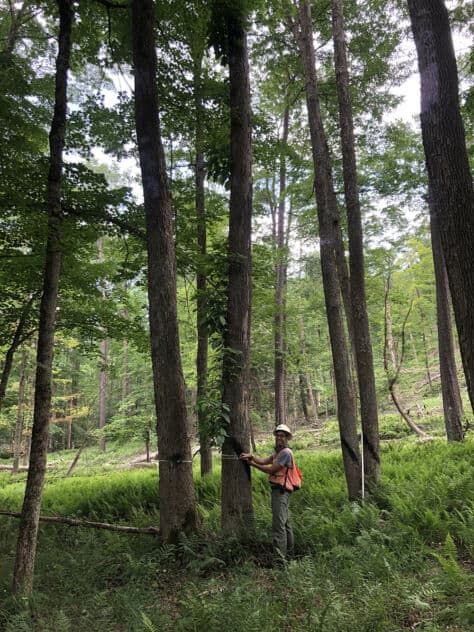WASHINGTON, PA (Aug. 12, 2020) – A grant awarded by The National Science Foundation (NSF) will support four projects developed by teams of faculty-researchers at schools across the nation, including Washington & Jefferson College.
The one-year, $86,735 grant is being awarded to Ohio Wesleyan University (OWU) to oversee the creation of online teaching tools that advance field ecology and data science. Laurel Anderson, Ph.D., OWU professor of botany-microbiology, is the principal investigator on the federal grant and is president of the Board of Directors for the Ecological Research as Education Network (EREN). She will partner with Dr. Tim McCay from Colgate University to administer the project.
Jason Kilgore, Ph.D., W&J Associate Professor of biology and vice president of the Board of Directors for EREN, will lead the Plants in the Human-Altered Environment (PHAE) project with Dr. Karen Kuers at The University of the South. The project helps students recognize the importance of trees and shrubs in the local landscape, whether they are living on campus or learning from home. Students will use a combination of online tools and field measurements to collect data and then compare their results to sites across the continent from other students and online data.
The teaching tools will use data and modified procedures from the National Ecological Observatory Network (NEON) to show students how local data connect to ecological patterns at a continental scale. NEON is a continental-scale ecological observation facility fully funded by the NSF and operated by Columbus, Ohio-based Battelle. NEON provides open data from 81 field sites nationwide to document how ecosystems are changing. The information is used to better understand how human activities affect ecology and how society can more effectively address critical ecological issues.
Dr. Kilgore will implement components of the PHAE project into two W&J courses this Fall, a non-majors course in economic botany and an introductory lab in evolution and biological diversity. He has already drawn international interest in this project through two webinars supported by the grant.
“We are very excited to collaborate with students and faculty from around the world to develop this project where students are gathering authentic data from online sources and field experiences to test real research questions across a broad geographic scale. This project will help students connect the local-to-global perspective in how we can manage our living environment to improve habitat and ecosystem services through trees.”
The other three projects sponsored by this NSF grant include:
- Backyard Pollinator Surveys led by Dr. Kaitlin Stack Whitney at the Rochester Institute of Technology.
- Mosquito Surveys along Anthropogenic Impact Gradients led by Dr. Allison T. Parker at Northern Kentucky University.
- Lichens in Diverse Landscapes led by Drs. Danielle Garneau at SUNY Plattsburgh, Matthew Heard at Belmont University, and Mary Beth Kolozsvary at Siena College.
More information on all four projects can be found on the EREN-NEON Flexible Learning Projects website.
About Washington & Jefferson College
Washington & Jefferson College, located in Washington, Pa., is a selective liberal arts college founded in 1781. Committed to providing each of its students with the highest-quality undergraduate education available, W&J offers a traditional arts and sciences curriculum emphasizing interdisciplinary study and independent study work. For more information about W&J, visit washjeff.dev, or call 888-W-AND-JAY.


